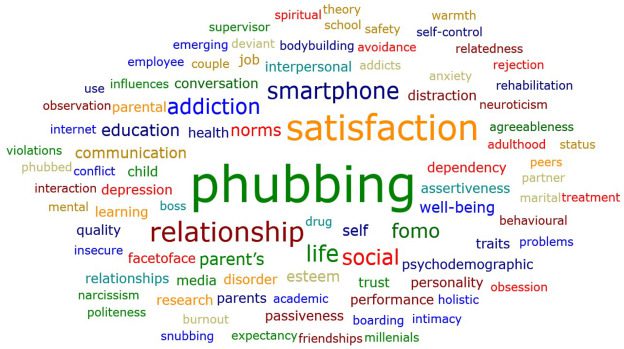Phubbing: the act of ignoring the people around you in favor of concentrating on your phone. Be honest, now – how many of us can truly say we’ve never done this? And if you’ve done it, you’ve probably also been annoyed by it. There’s lots of evidence to show that phubbing is not the road to harmonious relationships, romantic or otherwise.
And yet, it’s still so common. We took a look at what the science has to say about the irritating habit we just can’t kick.
The many facets of phubbing
A review by a team of researchers at the University of Extremadura in Spain and Curtin University in Australia looked at 84 phubbing studies published in peer-reviewed journals between 2012 and January 2020. By assessing the lay of the land in the field, they wanted to “stimulate and guide future studies in this new stream of research on the convergence of society, culture and communication.”
Research up to that time had covered a wide range of topics, as shown in the word cloud that the authors put together, and could be divided into five thematic areas: the cultural, communicational, social, psychological, and technological.

What this demonstrates is that the deceptively simple tendency towards doomscrolling Twitter when you should really be listening to your friend’s thrilling recollections of their holiday to Antigua is actually quite a multi-faceted behavior. What follows is only a selection of the complex factors that can lead to phubbing.
What drives us to phub?
The problem of self-control
In 2019, Jesper Aagaard of the Aarhus University published a paper that explored young people’s relationship with phubbing. Twenty-five students at a Danish business college (which take students aged between 16 and 20) were interviewed for the study.
One of the themes that emerged was that the young people felt there was a cultural difference between themselves and their parents regarding phone use. As one student told Aagaard: “When I’m with my friends, they just take it for granted. They use it all the time, too, you know?”
However, although they may be more accepting of a friend’s desire to quickly check a message or notification, the students did still claim to be annoyed by phubbing, calling it “disrespectful”. “Because it seems like you don’t want to be together with the people you’re with. And that’s so annoying,” said another interviewee.
But there again was the idea that, for all the irritation it causes, the students recognized a compulsion to phub in themselves: “But when I say that it’s annoying and that it annoys me when other people do it, I actually find myself doing it, too, sometimes. And that’s what’s… Not frustrating, but weird, I think.”
Aagaard terms this dichotomy “digital akrasia”. Akrasia is a concept that goes back to the days of Plato and Aristotle – it means acting against one’s better judgment. So, people who phub know it’s annoying, and don’t like it being done to them – yet this profoundly human trait means that, sometimes, they just can’t stop themselves.
Fear of missing out
Something else that’s been hypothesized as a driver of phubbing is the dreaded Fear of Missing Out, often called FoMO. The desire to check your newsfeeds for the latest updates might just be enough to draw your attention away from those around you.
As smartphone use becomes ever more commonplace, this is likely to only increase. We’ve grown used to being digitally connected around the clock – perhaps it’s understandable that we find it difficult to put that on the back burner in favor of in-person interactions.
The role of personality
Could it be the case that some people are just more likely to phub than others?
One study investigated potential links between excessive smartphone use and the five factor personality traits, finding that people scoring more highly for neuroticism and openness were more likely to be phubbers. The opposite was true for the traits of conscientiousness and agreeableness.
A recent study found – perhaps unsurprisingly – that being more prone to boredom was a significant driver of phubbing behavior. Another suggested that a vicious cycle could be at play, where those on the receiving end of phubbing from a romantic partner may be more likely to phub them back in a “tit for tat” scenario.
Finally, one study made perhaps the most simple but illuminating conclusion of all: people who think phubbing is acceptable are more likely to phub. Regardless of how annoying we find the behavior – or the word itself, for that matter! – we have reached a point where phubbing is a socially accepted norm. It may now be too late to turn back the tide on that; but, more research into this behavior may help us to be more conscious of why we do it, and more likely to be able to stop ourselves when we want to.
Now, let me just check my phone…
Source Link: The Science Of Phubbing Behaviors